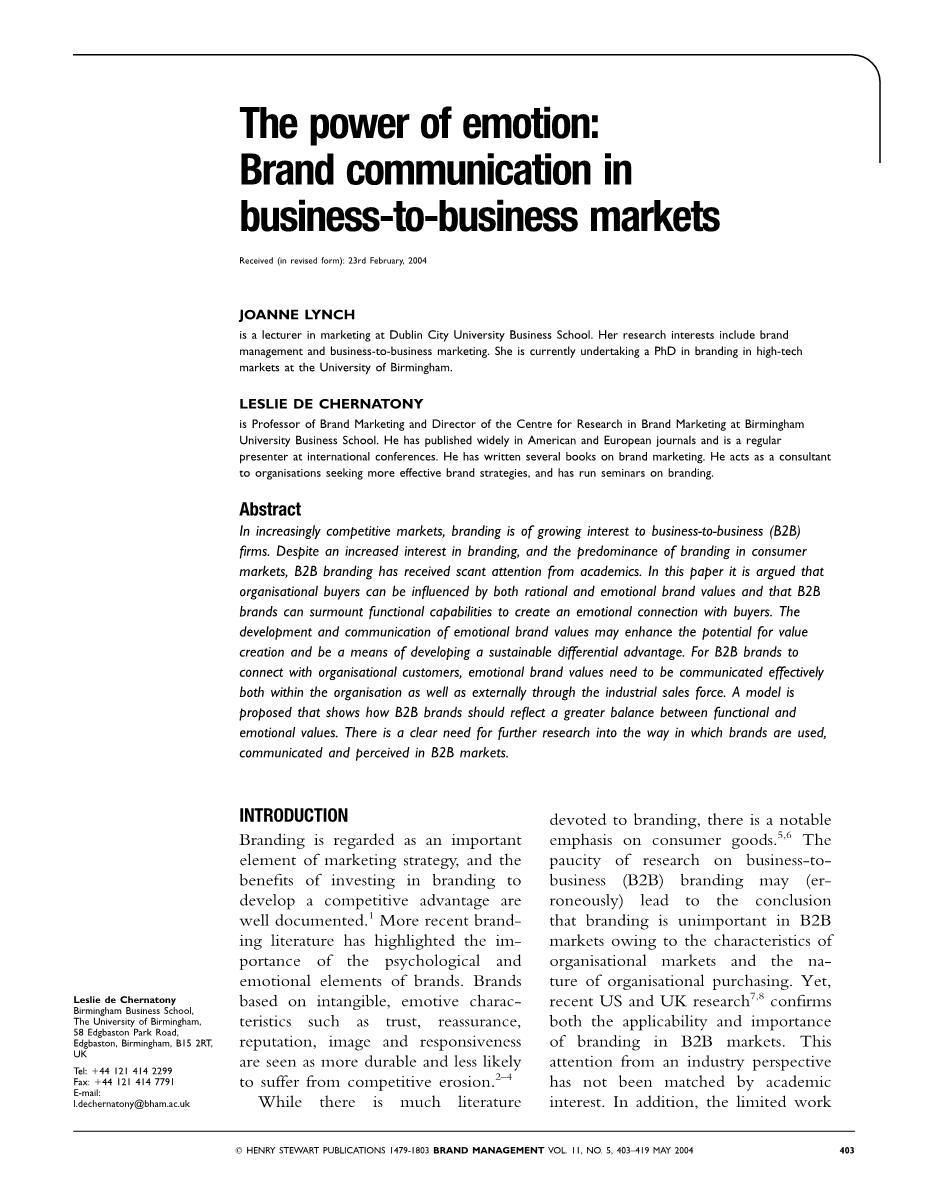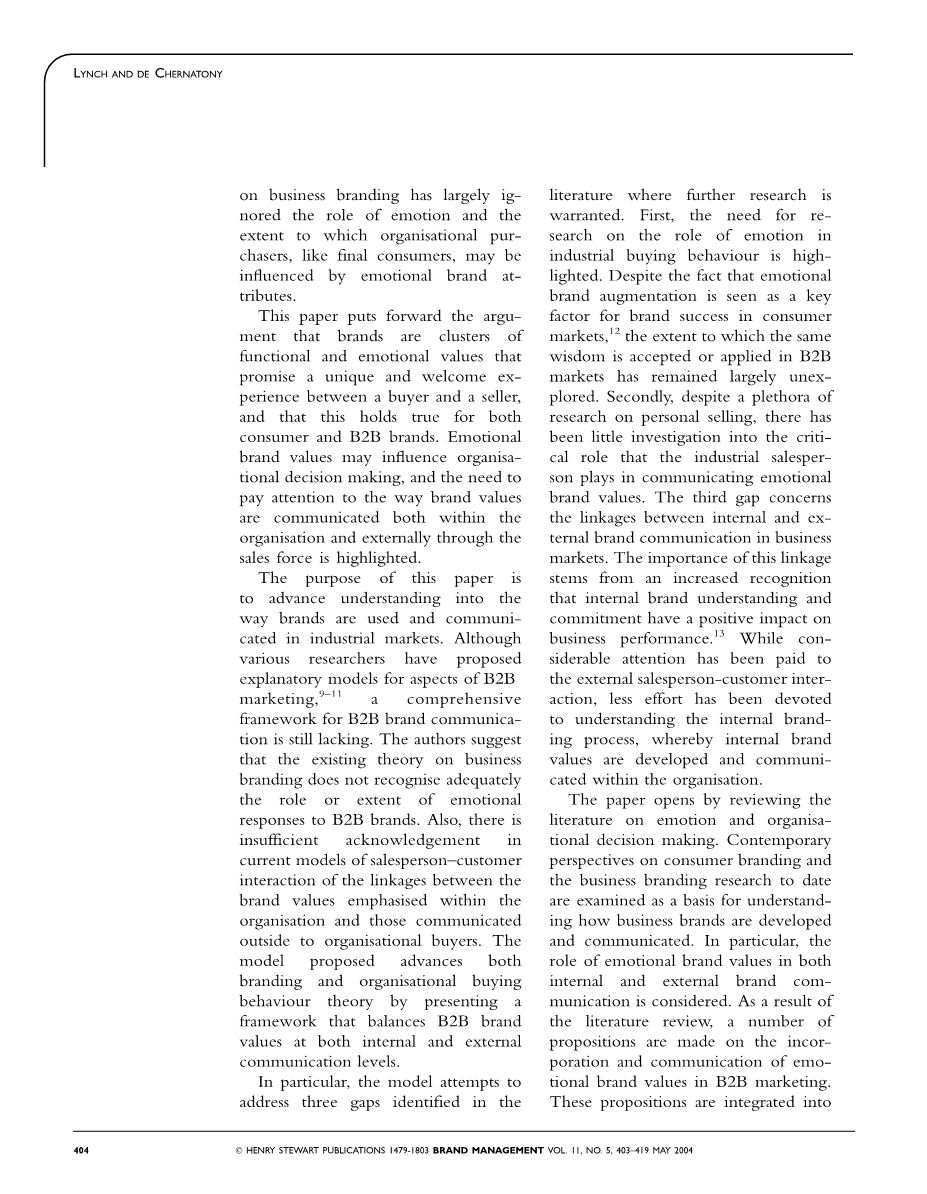

英语原文共 18 页,剩余内容已隐藏,支付完成后下载完整资料
The power of emotion:Brand communication in business-to-business markets
情感的力量:企业对企业市场中的品牌传播
JOANNE LYNCH
is a lecturer in marketing at Dublin City University Business School. Her research interests include brand management and business-to-business marketing. She is currently undertaking a PhD in branding in high-tech markets at the University of Birmingham.
Joanne Lynchis是都柏林城市大学商学院市场营销讲师。她的研究兴趣包括品牌管理和企业对企业营销。她目前正在伯明翰大学攻读高科技市场的品牌博士学位。
LESLIE DE CHERNATONY
is Professor of Brand Marketing and Director of the Centre for Research in Brand Marketing at Birmingham University Business School. He has published widely in American and European journals and is a regular presenter at international conferences. He has written several books on brand marketing. He acts as a consultant to organisations seeking more effective brand strategies, and has run seminars on branding.
Leslie de chernatony是伯明翰大学商学院品牌营销教授兼品牌营销研究中心主任。他在美国和欧洲的杂志上发表了广泛的文章,并在国际会议上担任定期主持人。他撰写了多本关于品牌营销的书籍。他担任寻求更有效品牌战略的组织的顾问,并举办品牌研讨会。
Abstract
In increasingly competitive markets, branding is of growing interest to business-to-business (B2B) firms. Despite an increased interest in branding, and the predominance of branding in consumer markets, B2B branding has received scant attention from academics. In this paper it is argued that organisational buyers can be influenced by both rational and emotional brand values and that B2B brands can surmount functional capabilities to create an emotional connection with buyers. The development and communication of emotional brand values may enhance the potential for value creation and be a means of developing a sustainable differential advantage. For B2B brands to connect with organisational customers, emotional brand values need to be communicated effectively both within the organisation as well as externally through the industrial sales force. A model isproposed that shows how B2B brands should reflect a greater balance between functional and emotional values. There is a clear need for further research into the way in which brands are used,communicated and perceived in B2B markets.
摘要:
在竞争日益激烈的市场中,企业对企业(B2B)公司对品牌的兴趣日益浓厚。尽管对品牌的兴趣增加以及消费者市场品牌的优势,但B2B品牌却很少受到学者的关注。在本文中,有人认为,组织购买者可以受理性和情感品牌价值的影响,B2B品牌可以超越功能性能力与买家建立情感联系。该情感品牌价值的发展和交流可能会增加价值创造的潜力,并成为发展可持续差异化优势的手段。要使B2B品牌与组织客户建立联系,情感品牌价值需要在组织内部以及外部通过工业销售人员进行有效沟通。提出了一个模型,显示B2B品牌应该如何反映功能和情感价值之间的更大平衡。明确需要进一步研究品牌在B2B市场中的使用,传播和感知方式。
INTRODUCTION
Branding is regarded as an important element of marketing strategy, and the benefits of investing in branding to develop a competitive advantage are well documented.1 More recent branding literature has highlighted the importance of the psychological and emotional elements of brands. Brands based on intangible, emotive characteristics such as trust, reassurance,reputation, image and responsiveness are seen as more durable and less likely to suffer from competitive erosion.2–4While there is much literature devoted to branding, there is a notable emphasis on consumer goods.5,6 The paucity of research on business-tobusiness(B2B) branding may (erroneously)lead to the conclusion that branding is unimportant in B2B markets owing to the characteristics of organisational markets and the nature of organisational purchasing. Yet, recent US and UK research7,8 confirms both the applicability and importance of branding in B2B markets. This attention from an industry perspective has not been matched by academic interest. In addition, the limited workon business branding has largely ignored the role of emotion and the extent to which organisational purchasers,like final consumers, may be influenced by emotional brand attributes.
介绍:
品牌被认为是营销战略的重要组成部分,并且投资品牌塑造发展竞争优势的好处已有文献记载.1最近的品牌文献强调了品牌心理和情感因素的重要性。以信任,放心,信誉,形象和响应等无形的,情感化的特征为基础的品牌被认为更耐用,更不容易遭受竞争的侵蚀.2-4虽然有很多关于品牌的文献,但着重强调消费者商品(B2B)品牌研究的缺乏可能(错误地)导致一个结论,即由于组织市场的特征和组织市场的特征,品牌在B2B市场中不重要。然而,近期美国和英国的研究7,8证实了品牌在B2B市场中的适用性和重要性。从行业角度来看,这种关注并未得到学术界的关注。此外,有限的工作业务品牌在很大程度上忽视了情绪的作用以及组织购买者(如最终消费者)可能受情绪品牌属性影响的程度。
This paper puts forward the argument that brands are clusters of functional and emotional values that promise a unique and welcome experience between a buyer and a seller, and that this holds true for both consumer and B2B brands. Emotional brand values may influence organizational decision making, and the need to pay attention to the way brand values are communicated both within the organisation and externally through the sales force is highlighted.The purpose of this paper is to advance understanding into the way brands are used and communicated in industrial markets. Although various researchers have proposed explanatory models for aspects of B2B marketing,9–11 a comprehensive framework for B2B brand communication is still lacking. The authors suggest that the existing theory on business branding does not recognise adequately the role or extent of emotional responses to B2B brands. Also, there is insufficient acknowledgement in current models of salesperson–customer interaction of the linkages between the brand values emphasised within the organisation and those communicated outside to organisational buyers. The model proposed advances both branding and organisational buying behaviour theory by presenting a framework that balances B2B brand values at both internal and external communication levels..
本文提出了这样的论点:品牌是功能性和情感性价值的集合,它们承诺买方和卖方之间独一无二的欢迎体验,这对于消费者和B2B品牌都适用。情感品牌价值可能影响组织决策,需要关注品牌价值的方式在组织内部和外部通过销售人员进行沟通。本文的目的是提高对品牌在工业市场中的使用和沟通方式的理解。尽管各种研究人员已经提出B2B营销方面的解释性模型,9-11还缺乏B2B品牌传播的综合框架。作者认为,现有的商业品牌理论没有充分认识到对B2B品牌的情绪反应的作用或程度。此外,在当前的销售人员 - 顾客互动模式中,组织强调的品牌价值与外部向组织购买者传达的品牌价值之间的联系模式缺乏足够的认识。提出的模型通过提出一个在内部和外部沟通层次平衡B2B品牌价值的框架,提出了品牌建设和组织购买行为理论。
In particular, the model attempts to address three gaps identified in theliterature where further research is warranted. First, the need
全文共25733字,剩余内容已隐藏,支付完成后下载完整资料
资料编号:[10136],资料为PDF文档或Word文档,PDF文档可免费转换为Word
以上是毕业论文外文翻译,课题毕业论文、任务书、文献综述、开题报告、程序设计、图纸设计等资料可联系客服协助查找。


